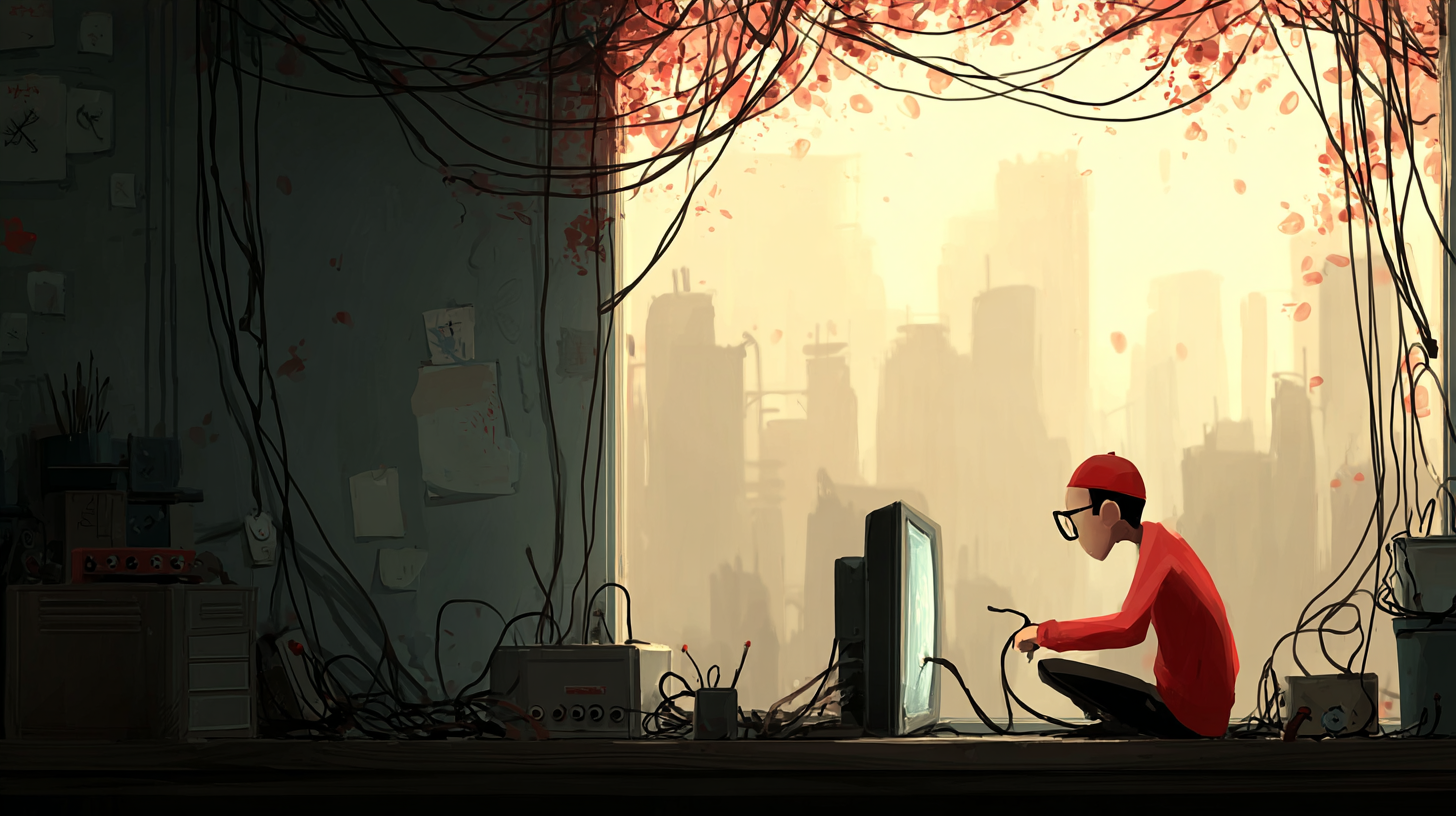“Cable” means a thick wire or a system for TV programs.
「cable」は太い電線やケーブル、またはテレビ放送のケーブルを指す言葉
以下は英単語 “cable” に関するストーリー型学習コンテンツです。まずは大枠の意味を理解して最後の文章で確認しましょう。
主な意味(main meaning)
| 品詞 | 意味 | 発音記号 | 例文 |
|---|---|---|---|
| 名詞 | 太い電線、ケーブル | /ˈkeɪ.bəl/ | The internet cable is not connected. |
| 名詞 | ケーブル放送 | /ˈkeɪ.bəl/ | We watch movies on cable TV. |
| 動詞 | ケーブルでつなぐ | /ˈkeɪ.bəl/ | The ship was cabled to the dock. |
語源(etymology)
「cable」はラテン語「capulum(ロープ)」から古フランス語「cable」を経て英語に入りました。元々は「太いロープ」や「つなぐもの」というイメージを持っています。
類義語(synonyms)
| 類義語 | 例文 |
|---|---|
| wire | The electrician fixed the broken wire. |
| cord | I need a longer cord for my phone charger. |
| rope | The rope was used to tie the boat. |
| line | Fishermen use a strong line to catch big fish. |
反義語(antonyms)
| 反義語 | 例文 |
|---|---|
| wireless | My headphones are wireless, so I don’t need a cable. |
| cordless | She bought a cordless vacuum cleaner. |
コロケーション(collocations)
| コロケーション | 例文 |
|---|---|
| cable TV | Many people still enjoy watching cable TV. |
| cable company | The cable company fixed the problem quickly. |
| cable car | We took a cable car up the mountain. |
| power cable | Please check if the power cable is plugged in. |
| undersea cable | The undersea cable connects the two countries. |
2項表現(binomials)
| 2項表現 | 例文 |
|---|---|
| wires and cables | The workers organized the wires and cables. |
| rope and cable | The climber carried rope and cable for safety. |
英語ストーリー(english story)
Michael worked at a small company that provided cable TV services. Every morning, he checked reports from customers. That day, one message said, “The power cable of my cable box is broken.” Another message complained, “I lost connection to my favorite show on cable TV.”
Michael called his friend Anna, who also worked at the company. “We have many problems with cables today. Can you help me?” he asked.
Anna laughed. “Of course. It seems we need to deal with many wires and cables.”
They went to a customer’s house. A woman welcomed them inside and pointed to the back of her TV. The cord was too short, so it could not reach the outlet. Michael said, “Don’t worry, I will replace it with a longer wire.”
Anna noticed that the woman’s son was playing with a toy rope and cable set. She smiled and said, “That’s funny. Even at home, people use the word ‘cable’ in many ways.”
Later, Michael and Anna drove to a hotel. The manager said, “Guests cannot watch cable TV. Maybe the problem is with the undersea cable that connects the island to the mainland.” Michael replied, “No, it’s not the undersea cable. I think the signal is blocked by damaged equipment.”
At the hotel, they saw workers climbing with rope and cable to repair a satellite dish. “It’s like riding a cable car,” Anna joked.
When the problem was fixed, the manager smiled. “Thank you. People love our movies, so we must keep cable TV working.”
On the way back to the office, Anna asked, “Do you ever want to change jobs?” Michael shook his head. “No, I like this work. Even though we always deal with cables, cords, and wires, I feel proud. Without us, people cannot enjoy shows, news, or even internet. Wireless is popular, but wireless cannot replace every cable yet.”
That evening, Michael wrote in his diary, “Today I fixed many cables. A simple cable may look small, but it connects people to the world.”
和訳
マイケルは小さな**ケーブルテレビ(cable TV)の会社で働いていた。毎朝、彼は顧客からの報告を確認する。その日、あるメッセージには「私のケーブルボックスの電源ケーブル(power cable)が壊れています」と書かれていた。別のメッセージには「私のお気に入りの番組がケーブルテレビ(cable TV)**で映りません」とあった。
マイケルは同じ会社で働く友人アンナに電話をした。「今日はケーブルの問題が多いんだ。手伝ってくれる?」と彼は聞いた。
アンナは笑って答えた。「もちろん。今日は**ワイヤーとケーブル(wires and cables)**とたくさん向き合う必要があるみたいね。」
彼らはある顧客の家に行った。女性が家に迎え入れ、テレビの後ろを指さした。コードが短すぎてコンセントに届かなかったのだ。マイケルは「大丈夫です。もっと長い**ワイヤー(wire)**に交換しますね」と言った。
アンナはその女性の息子が**ロープとケーブル(rope and cable)**の玩具で遊んでいるのを見て微笑んだ。「おもしろいですね。家でも『ケーブル』という言葉をいろいろな意味で使いますね。」
その後、二人はホテルへ向かった。支配人が言った。「お客様がケーブルテレビを見られません。たぶん本土と島をつなぐ**海底ケーブル(undersea cable)**に問題があるのでは?」マイケルは「いいえ、海底ケーブルではありません。おそらく設備の故障で信号が止まっているのです」と答えた。
ホテルでは作業員が衛星アンテナを直すために**ロープとケーブル(rope and cable)で登っていた。「まるでケーブルカー(cable car)**に乗っているみたいだね」とアンナは冗談を言った。
問題が解決すると、支配人は笑顔で言った。「ありがとうございます。お客様は映画を楽しみにしていますから、ケーブルテレビは大切なんです。」
帰り道、アンナが聞いた。「仕事を変えたいと思うことはない?」マイケルは首を振った。「いや、この仕事が好きだよ。毎日ケーブルやコードやワイヤーを扱うけれど、誇りを持っている。僕たちがいなければ、人々は番組やニュースやインターネットを楽しめない。**ワイヤレス(wireless)は人気だけど、まだすべてのケーブル(cable)**を置き換えることはできないんだ。」
その夜、マイケルは日記に書いた。「今日はたくさんのケーブルを直した。小さな**ケーブル(cable)**だけど、人々を世界とつないでいる。」
Q&A
Q: 「cable」と「wire」の違いは何ですか?
A: 「wire」は細い金属の電線や針金を指します。家庭の電気配線や電子機器の内部に使われることが多いです。一方「cable」は複数のwireをまとめた太い電線や通信線を指し、電力や通信に使われます。
Q: 「cable」と「cord」はどう違いますか?
A: 「cord」は細いケーブルで、家庭用の電源コードや充電器の線などを指すことが多いです。「cable」はより太く、頑丈で、大きな電力や通信に使われます。
Q: 「cable」と「rope」はどう違いますか?
A: 「rope」は電気や通信とは関係なく、物を結んだり、登ったりするための太い縄を指します。「cable」は金属やゴムで覆われた電線や通信線のことです。
Q: 「cable」と「line」はどう違いますか?
A: 「line」は「線」を広く意味し、電話線や釣り糸などでも使われます。「cable」は特に電気や通信に使う太い線を指します。
Q: 「cable」と「cable TV」はどう違いますか?
A: 「cable」は物としてのケーブルそのものを指します。「cable TV」はケーブルを使って配信されるテレビサービスのことです。
Q: 「cable」と「cable company」はどう違いますか?
A: 「cable」は線そのものですが、「cable company」はケーブルテレビやインターネットを提供する会社のことです。
Q: 「cable」と「cable car」はどう違いますか?
A: 「cable」は線のことですが、「cable car」はケーブルで引っ張られる乗り物、つまりロープウェイやケーブルカーを指します。
Q: 「cable」と「power cable」はどう違いますか?
A: 「cable」は一般的なケーブル全体を指し、「power cable」は特に電気を供給するための電源ケーブルを意味します。
Q: 「cable」と「undersea cable」はどう違いますか?
A: 「cable」は広くケーブルのことを言いますが、「undersea cable」は特に海底に敷設され、国や大陸をつなぐ通信ケーブルを指します。



コメント